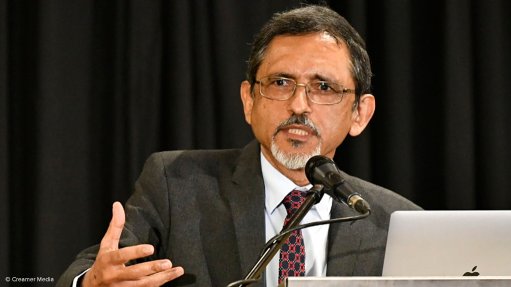
Trade, Industry and Competition Minister Ebrahim Patel
Photo by: Creamer Media's Donna Slater
To boost productivity in South Africa, four key business factors need urgent and significant attention, namely increasing energy security, increasing government spending on infrastructure projects, ensuring compliance with local procurement policies and using South Africa’s competitive advantage to the benefit of local businesses, Trade, Industry and Competition Minister Ebrahim Patel has said.
Speaking at the Proudly South Africa Buy Local Summit on March 27, he admitted that, although “energy has become now the central preoccupation of the country”, energy availability is critical to localisation and to drive industrialisation.
“Our success in assuming a localisation effort is going to be dependent on the speed with which we are able to bring enormous quantities of additional energy into our grid,” said Patel.
The second major obstacle in jobs creation and government contribution to gross domestic product was slow movement in getting major infrastructure projects off the ground – spending on which peaked in 2014.
In this regard, he said a big part of government’s localisation efforts had recently gone into increasing infrastructure spending, which stood to benefit labour-intensive industries such as the steel, construction, chemicals and machinery production companies.
“All of those have been boosted by infrastructure spending.
“Infrastructure spending is a key driver of growth, and of opportunities for locals.
“It has taken time to get the 'ship-of-infrastructure-spending' turned around; but this is an area now where we believe we are able to make significant progress,” said Patel.
The third challenge is procurement policies and a lack of adherence thereto within the State and in the private sector.
“I am pleased to say that, over the last number of years, we have been able to demonstrate that a new procurement strategy by the State is having a positive effect.
“I have opened up a number of factories where those business people have assured me that the logic of them setting up an operation and expanding it is that they now have greater assurance of getting orders from the State,” he stated.
However, Patel said boosting local procurement was an uneven task, “not without its challenges”.
He said slippages in procuring locally made products occurred from time to time, especially with big procurement orders, where sometimes, products were sourced from primarily Asia.
“We have got to be vigilant. You have got to recognise the slippage and deal with [it] as [such incidents] come about,” said Patel.
He added that the private sector experienced a “very significant shift” in attitudes towards procurement.
In terms of competitiveness, Patel pointed out that South Africa had a good standing on the global stage, with many of its locally made products being highly sought-after.
However, he said that to take better advantage of its competitiveness, South African manufacturers needed to find ways of adding or boosting their value add to products, which will serve to further boost competitiveness and lead to customers seeking out South African made products more.